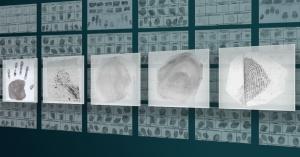Neurotechnology’s Latent Fingerprint Technology Ranks Among Top Performers in NIST ELFT Evaluation
Neurotechnology’s latent fingerprint submission delivered top results in a recent NIST evaluation, demonstrating major advancements.
Latent prints present some of the most complex challenges in biometrics. The latest results show that our technology is among the most accurate in the world for solving difficult cases.”
VILNIUS, LITHUANIA, September 24, 2025 /EINPresswire.com/ -- Neurotechnology, a provider of deep learning-based solutions and high-precision biometric identification technologies, today announced its continued success in the National Institute of Standards and Technology (NIST) Evaluation of Latent Friction Ridge Technology (ELFT). The company’s latest fingerprint algorithm submission showcased significant performance enhancements that further increased accuracy, advancing Neurotechnology’s high ranking despite intense competition.— Evaldas Borcovas, Head of Biometrics Research for Neurotechnology
“Latent prints present some of the most complex challenges in all biometrics, so we are very proud of the significant improvements we’ve made”, said Evaldas Borcovas, Head of Biometrics Research for Neurotechnology. “The latest results confirm our rapid progress and show that our technology is among the most accurate in the world for solving difficult cases that could not be solved in the past.”
For many years, Neurotechnology’s algorithms have consistently achieved among the highest rankings for accuracy, and this latest ELFT submission demonstrated a reduction in error rate by up to three times compared to the company’s previous submission.
The NIST ELFT evaluation assesses how well biometric algorithms can accurately identify a person from latent fingerprints found at crime scenes. The evaluation uses large-scale datasets from U.S. government and law enforcement institutions, including the Department of Defense (DoD) and the FBI, with a gallery of over 1.6 million subjects with fingerprint and palmprint impressions.
The evaluation uses two key testing metrics:
• Identification (FNIR@FPIR): The system uses a fixed threshold to determine a match without human intervention. The aim is to measure the algorithm’s accuracy (False Negative Identification Rate or FNIR) at a specific tolerance for false positives (False Positive Identification Rate or FPIR).
• Investigation (FNIR@Rank_X): The system provides a ranked list of potential matches, and the metric measures the algorithm’s accuracy (FNIR) at a given rank (e.g., Rank 10). This shows how often the correct match is returned within the top results for an examiner to review.
The evaluation covered three datasets: the DoD Dataset #1 with 5,259 searches, the FBI Laboratory Solved #1 dataset with 516 searches and the FBI Laboratory dataset with 49 searches.
In identification, Neurotechnology’s algorithm ranked third in the DoD dataset, fourth in the FBI Laboratory Solved dataset and shared first place in the FBI Laboratory dataset.
In investigation, the algorithm showed the best accuracy across all ranks in the DoD dataset, achieved top three accuracy in the FBI Laboratory Solved dataset and top two in the FBI Laboratory dataset.
These consistent improvements demonstrate Neurotechnology’s commitment to providing highly reliable and precise biometric solutions for the most challenging forensic and law enforcement cases.
The high-precision technology used in these tests is integrated into Neurotechnology’s MegaMatcher Criminal Investigation solution. This system is specifically tailored to help forensic and law enforcement professionals solve difficult cases by providing a fast and accurate way to identify individuals from challenging biometric evidence like latent prints.
About Neurotechnology
Neurotechnology is a developer of high-precision algorithms and software based on deep neural networks and other AI-related technologies. The company was launched in 1990 in Vilnius, Lithuania, with the key idea of leveraging neural network capabilities for various applications, such as biometric person identification, natural language processing (NLP), computer vision and artificial intelligence. The company's solutions and products have been used in more than 140 countries worldwide and in many national-scale projects for national ID, passports, elections, law enforcement and border control, including India's Aadhaar program, general elections in Ghana and Liberia, voter deduplication for the Democratic Republic of the Congo and other projects that collectively process the biometric data of nearly two billion people.
Jennifer Allen Newton
Bluehouse Consulting Group, Inc.
+1 503-805-7540
email us here
Visit us on social media:
LinkedIn
Facebook
X
Legal Disclaimer:
EIN Presswire provides this news content "as is" without warranty of any kind. We do not accept any responsibility or liability for the accuracy, content, images, videos, licenses, completeness, legality, or reliability of the information contained in this article. If you have any complaints or copyright issues related to this article, kindly contact the author above.


